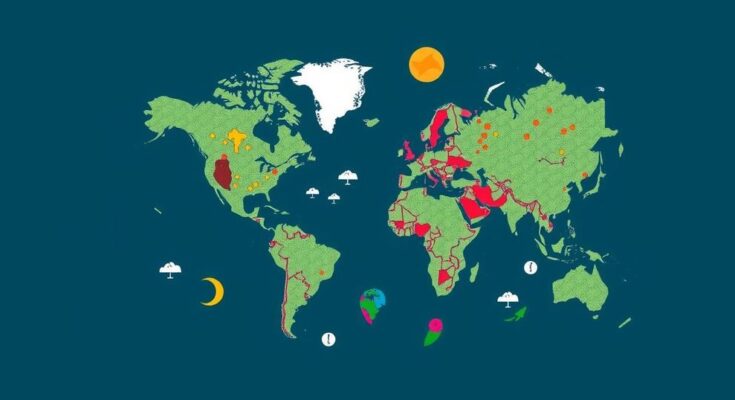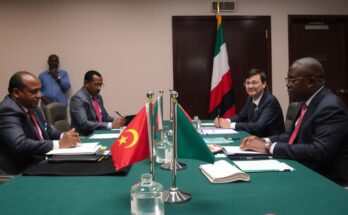The COP29 summit in Azerbaijan resulted in a controversial $300 billion annual climate finance deal, receiving mixed responses from delegates. While some viewed it as progress, many developing nations criticized it as inadequate. The summit highlighted ongoing geopolitical challenges affecting climate cooperation, with fears surrounding the incoming U.S. administration’s stance on the Paris Agreement. The need for greater commitment from wealthier nations remains a contentious issue as the world faces rising climate impacts and emissions.
The COP29 summit in Azerbaijan culminated in the adoption of a $300 billion annual global finance target to aid developing nations in combatting climate change; however, reactions to this agreement were sharply divided. Some attendees expressed satisfaction with the perceived progress, while others departed in disappointment and anger. Cop29 President Mukhtar Babayev delivered a speech that balanced optimism and recognition of setbacks, ultimately celebrating the finance plan despite the criticisms it faced from many climate-vulnerable nations.
The negotiations leading up to COP29 showcased significant challenges, including a lack of consensus among participating nations, notably between developed and developing countries. The mixed feelings were compounded by fears surrounding the incoming U.S. administration’s possible withdrawal from the Paris Agreement under President Donald Trump. The agreement reached aims to substantially increase climate finance from wealthy nations, but critics argue it falls short of necessary commitments.
Developing countries, in particular, voiced their concerns over the inadequacies of the deal. While the summit’s outcome represented progress, the substantial voices from nations such as India and Nigeria indicated a feeling of betrayal as they accused COP29 leadership of sidestepping their consent during negotiations. Furthermore, global geopolitical tensions, including the war in Ukraine, diverted focus, complicating efforts to secure more robust climate financing.
Despite the hurdles, COP29 achieved important milestones in carbon market legislation, highlighting the complexity of achieving a unified international response to climate change amid rising emissions and urgent environmental crises. The divergent perspectives on the outcomes have led to fears that the negotiations set precedence for upcoming conferences, particularly COP30 in Brazil, where the challenges of building trust between nations will be paramount.
The COP (Conference of the Parties) serves as the primary global forum for addressing climate change, bringing together representatives from nearly every country. The climate finance target adopted at COP29 reflects ongoing efforts to assist developing nations, whose vulnerability to climate impacts necessitates substantial financial support. However, negotiations often reveal systemic divides between wealthier countries, which historically contribute more to climate issues, and developing nations seeking assistance and accountability. The geopolitical landscape, specifically the fluctuating commitments from major economies like the United States, continues to complicate these discussions. As the world faces escalating environmental challenges, the effectiveness of such summits in producing meaningful and equitable outcomes remains under scrutiny.
The outcomes of COP29 in Azerbaijan reveal deep divisions in global climate negotiations, with the $300 billion finance deal garnering mixed reactions indicative of the underlying tensions that persist between developed and developing nations. While progress was made in areas such as carbon market legislation, the disappointment expressed by many developing countries highlights the complexities of climate cooperation amidst political turbulence and rising emissions. As the global community prepares for COP30 in Brazil, restoring trust and commitment among nations will be crucial for addressing the ongoing climate crisis aggressively and effectively.
Original Source: www.asiafinancial.com




